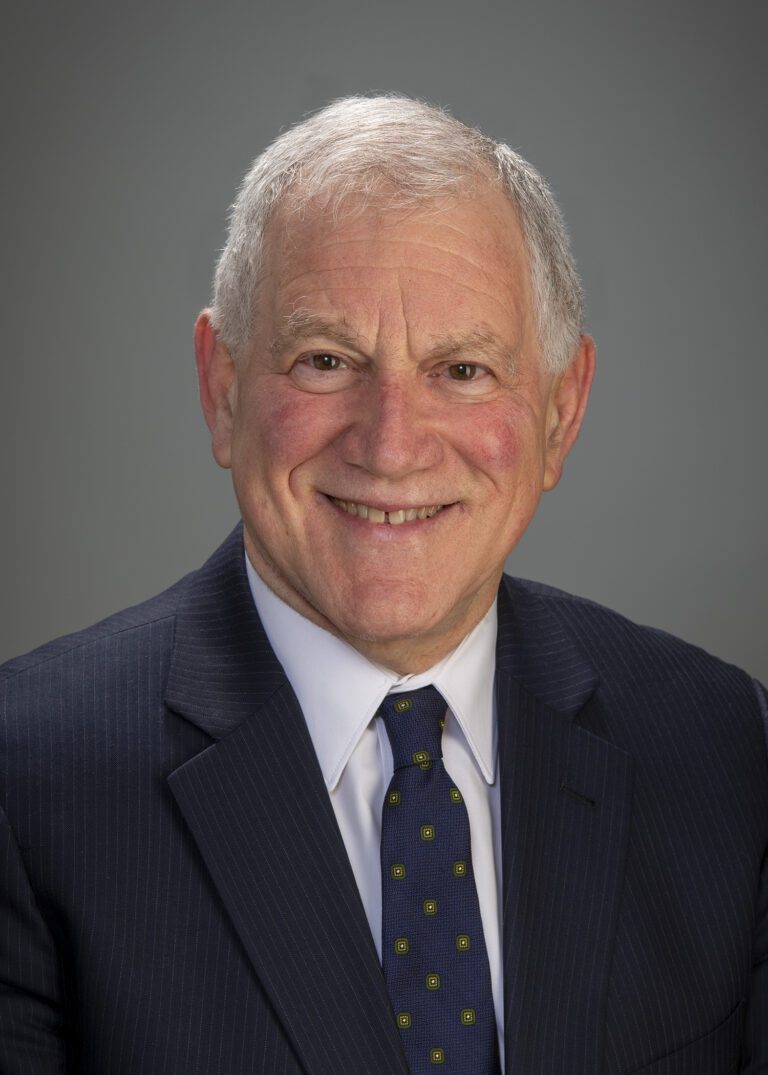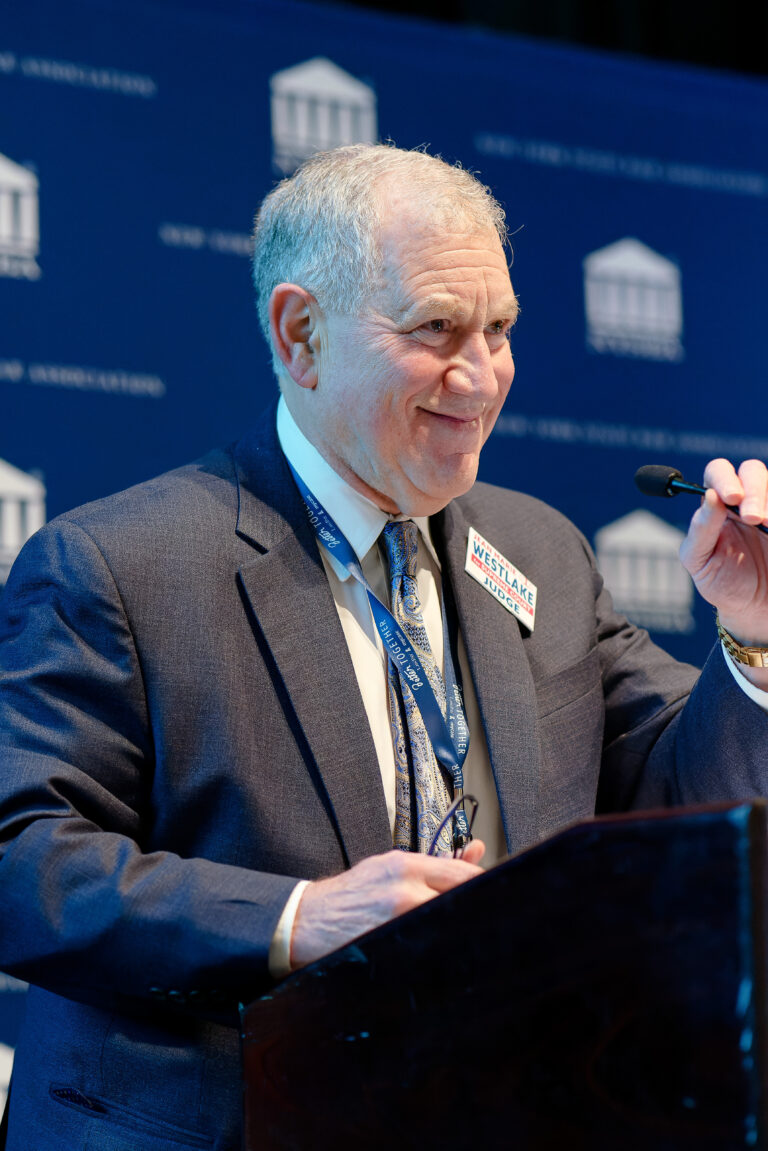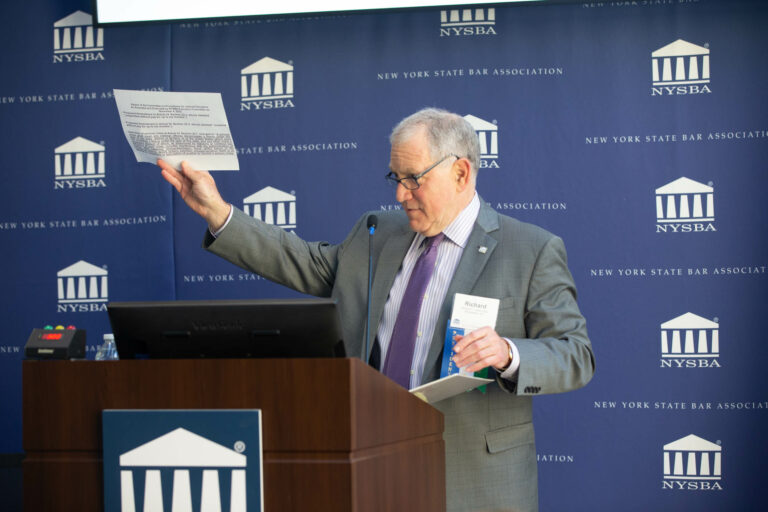NYSBA’s New President’s Mission: We Need To Make it Easier for Members To Be Great Lawyers
6.1.2023

Incoming New York State Bar Association President Dick Lewis views his new role as an opportunity to help remove the hurdles that prevent lawyers around the state from fully realizing their potential to succeed professionally while serving clients and expanding access to justice.
That includes everything from contradictory court rules to onerous requirements for notaries – basically any restriction that prevents lawyers from being the best they can be.
Lewis feels strongly that these and other roadblocks not only lead to increased costs for clients, but also deplete a lawyer’s ability to take on pro bono cases and serve community organizations. During his one-year tenure, he will focus on making it easier for attorneys to contribute to the greater good of a noble profession – particularly those who don’t have in-house support.
“We are here to fight for lawyers, reduce the barriers in their practice and deal with those day-to-day issues that affect them; that is our mission,” Lewis said. “While we are committed to supporting all our members, I’m particularly aware of the challenges faced by solo and small firm practitioners – they are our heroes.”
“Protecting the vulnerable is part of our pledge to improve access to justice,” he added. “When we make it easier for lawyers to do their jobs, we free time and energy for them to help make the world a better place.”
Lewis has firsthand experience of the demands placed on attorneys who don’t work at large firms, having spent years early in his legal career working at a smaller firm with only a handful of colleagues. In a rapidly changing profession, the New York State Bar Association can serve as a resource to help members thrive, Lewis said.
“It’s hard work,” he recalled of his days as a small firm practitioner. “You’re running from court to court in a thousand directions, while balancing your family and community commitments.”
Lewis’ work on the Task Force on Rural Justice and the Committee on Law Practice and Court Rules also gave him a deeper understanding of the needs and problems members are facing across New York. New court rules, a shortage of attorneys in rural areas, and limited broadband access were just some of the issues that spurred Lewis to action.
On the policy front, Lewis plans to focus on advocating on behalf of the state’s growing homeless population, supporting New Yorkers facing end-of-life decisions, and combatting anti-Asian and antisemitic hate crimes, which have reached historically high levels.
Committee on Law Practice and Court Rules
To inform his efforts to support attorneys in their professional endeavors, Lewis plans to collect feedback from members from all regions and backgrounds. He feels strongly that a diversity of opinion is critical to ensure that resulting policies are as inclusive as possible.
“I encourage everyone from every area of practice to get involved,” Lewis said. “We need to hear all voices. Please don’t sit on the sidelines. We need more people to be active to shape the future of our organization and ensure its long-term success.”
Lewis and members of the Committee on Law Practice and Court Rules will use member input to help inform the continuing dialogue on these issues with the Office of Court Administration, the State Legislature, and Gov. Kathy Hochul’s office.
Lewis continues to be concerned about the shortage of lawyers willing to serve as assigned counsel, though he hopes that a recently approved pay raise for assigned counsel will increase this number.
The Bar Association sued the state in November 2022, urging that the state be required to pay $158 per hour – the rate paid to assigned counsel in New York City –to assigned counsel outside of the city. When the state budget included the pay raise for lawyers outside of New York City, NYSBA withdrew the motion to the court. This marked the first pay increase for assigned counsel attorneys in nearly two decades.
“We also want to make sure that our prosecutors are able to prosecute, and our defenders are able to defend,” Lewis said. “If there continues to be a dearth of attorneys interested in this type of service, that must be confronted.”
Lewis would like to see a public service incentive program providing federal loan forgiveness for lawyers who work in underserved areas – similar to what is currently available for teachers and doctors. In May, the association’s Executive Committee authorized joining with the California Lawyers Association to lobby for that proposal at the American Bar Association’s Annual Meeting taking place in Denver this August.
Broome County Born & Bread
As a native of Binghamton, Lewis is very familiar with the difficulties that come with encouraging lawyers to practice in non-urban areas. This still surprises him, however, because there is no place he would rather be. He has a deep love for his hometown and calls his early years growing up in Binghamton idyllic, recalling how it was perfectly normally to leave the keys in your parked car overnight.
Lewis attained his bachelor’s degree at Ithaca College. Following his undergraduate studies, He started a career in the insurance industry before a local family friend convinced him to pursue law, which led him to the John Marshall School of Law in Chicago.
Following law school, Lewis returned to the Southern Tier to make his own way by starting in general practice. He speaks fondly of his service for the Broome County Bar Association, working on local concerns of the members and really getting to know them.
Lewis cherishes those relationships and the opportunities he had to see how work at the local bar level can have a direct impact on members. As president of the Bar Association, he will bring that same energy to statewide issues, explaining: “If we can bring out our issues to the Office of Court Administration, the Legislature, and the governor, we can create a better environment for the practice of law.”
Combatting Homelessness and Supporting Health Care Rights

Lewis believes it imperative to answer the call to service. To that end, he plans to establish task forces combatting homelessness, anti-Semitism and anti-Asian hate and improving end of life health care rights in the coming year.
The task force against homelessness will focus on populations that have disproportionately high percentages of people with no place to live, including veterans, those who struggle with substance use, people who have mental health challenges, and victims of domestic violence.
“The United States is the greatest country in the history of the world,” Lewis said. “For us to have this lingering issue of homelessness is shameful.”
“We will look at all these issues while respecting individual rights,” he added. “In the end, don’t we have an obligation to step in and help when people are in a life-and-death situation?”
Individual liberties and dignity are at the heart of another Lewis initiative: the Task Force on Medical Aid in Dying. Members of this task force will research the issue and the impacts that legislative action may have on patients and their families – particularly when it comes to the legal ramifications of these difficult but important decisions – and make recommendations about best practices. They will also look at inequities and disparities in accessing end-of-life care.
A renewed focus on civics education will take place at Lewis’ Convocation, which is set for May 2024. At this event, Lewis plans to bring together judges, lawyers, students, educators, and special guests to engage in a vigorous, respectful, and healthy debate, recognizing that protecting and strengthening democracy is critical to preserving the rule of law.
“Our kids need to learn how to listen to people that disagree with them with respect,” Lewis said. “Fostering civics education and debate will preserve and bolster our democracy for us and our children.”
Lewis says that the best career advice he ever received was to “never forget where you came from.” Throughout his professional career, he has taken that advice to heart. From his early days of running between courthouses in Broome County to his work on the Task Force on Rural Justice and the Committee on Access to Justice, Lewis is at his core a lawyer’s lawyer.
Above all, Lewis stressed that during his presidential tenure he wants “every member to know that they are an important part of this association and that their voice matters.”
Lewis resides in Binghamton with his wife, Lori, who was also born and raised in the Southern Tier. They have two daughters, Emily and Anna, who are proud graduates of Binghamton High School, and upstate colleges.

Richard Lewis and his daughters, Anna and Emily, and wife Lori



